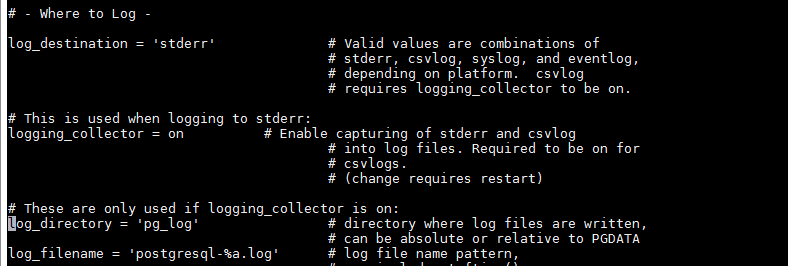listen_addresses (string)
-> Specifies the TCP/IP address(es) on which the server is to listen for connections from client applications.
-> The special entry ‘*’ corresponds to all available IP interfaces.
-> The entry 0.0.0.0 allows listening for all IPv4 addresses and :: allows listening for all IPv6 addresses.
-> The default value is localhost

port (integer):
-> The TCP port the server listens on; 5432 by default.
-> The same port number is used for all IP addresses the server listens on. This parameter can only be set at server start.
![]()
max_connections (integer)
-> Determines the maximum number of concurrent connections to the database server.
-> The default is typically 100 connections, but might be less if your kernel settings will not support it (as determined during initdb).
![]()
shared_buffers (integer)
-> Sets the amount of memory the database server uses for shared memory buffers. The default is typically 128 megabytes (128MB), but might be less if your kernel settings will not support it.
-> A dedicated database server with 1GB or more of RAM, a reasonable starting value for shared_buffers is 25% of the memory in your system.

log_destination (string)
-> PostgreSQL supports several methods for logging server messages, including stderr, csvlog and syslog.
-> Set this parameter to a list of desired log destinations separated by commas. The default is to log to stderr only.
log_directory (string):
-> When logging_collector is enabled, this parameter determines the directory in which log files will be created.
-> It can be specified as an absolute path, or relative to the cluster data directory.
-> This parameter can only be set in the postgresql.conf file or on the server command line. The default is pg_log.
log_filename (string):
-> When logging_collector is enabled, this parameter sets the file names of the created log files.
-> The default is postgresql-%Y-%m-%d_%H%M%S.log.
-> To get the log file name with the day like this ‘postgresql-Wed.log’ then
log_filename = ‘postgresql-%a.log’

log_truncate_on_rotation (boolean)
-> When logging_collector is enabled, this parameter will cause PostgreSQL to truncate (overwrite), rather than append to, any existing log file of the same name
log_truncate_on_rotation = on


